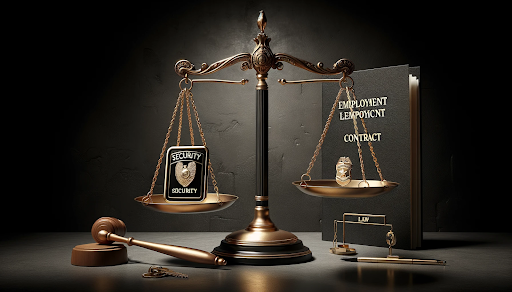Understanding the landscape of employment law is crucial when managing security personnel. This is not just about ensuring compliance with legal standards but also about fostering a work environment that respects the rights and duties of both employers and employees. This blog post aims to provide an overview of the key legal considerations for property managers, chief security officers, and security company hiring managers who are involved in hiring, managing, and disciplining security staff.
Hiring Security Personnel
When bringing new security staff into your team, the hiring process must adhere to employment law to prevent discrimination and ensure fairness. Here’s what you need to consider:
-
Non-Discriminatory Hiring Practices: Federal and state laws prohibit discrimination based on race, color, religion, sex, national origin, age, disability, or genetic information. Make sure your job postings, interview questions, and selection criteria comply with these laws.
-
Background Checks: Security personnel often undergo background checks. Ensure that these checks comply with the Fair Credit Reporting Act (FCRA) and any local laws regarding criminal history and credit background checks.
-
Employment Agreements: Clearly outline terms of employment in a written contract. This includes job duties, compensation, work hours, confidentiality requirements, and termination conditions. These agreements can help prevent future legal disputes.
-
Training and Certification Requirements: Depending on the location and nature of the job, security staff may need specific certifications. Compliance with state and federal regulations regarding training and certification is vital for legal operation and insurance purposes.
Managing Security Personnel
Effective security staff management involves understanding the balance between leadership and legal compliance. Here are some key aspects:
-
Workplace Safety and Health: Compliance with the Occupational Safety and Health Administration (OSHA) regulations is crucial. Provide a safe working environment and proper training on workplace safety, especially considering the potentially hazardous nature of security work.
-
Fair Labor Standards: Ensure you meet the standards set by the Fair Labor Standards Act (FLSA), which covers wage, overtime pay, and hours worked. Security personnel often work odd hours; thus, understanding overtime rules is essential.
-
Employee Rights and Privacy: Be aware of your employees' rights to privacy, even in a security-focused workplace. This includes considerations about surveillance and personal information handling.
Disciplining Security Personnel
Disciplining staff can be a sensitive area where legal considerations are crucial to ensure fair treatment and protect your organization from lawsuits.
-
Consistent Disciplinary Policies: Establish clear, documented disciplinary procedures that align with company policy and legal standards. This ensures that all staff are treated fairly and equally.
-
Documentation: Keep detailed records of disciplinary actions, including the reasons for the discipline and the steps taken. Documentation is crucial in the event of disputes or legal challenges.
-
Performance Reviews: Regular performance reviews can help manage expectations and provide a framework for discussing job performance issues before they necessitate discipline.
When Things Go Wrong
Despite best efforts, legal issues can arise. In such cases, having legal support is crucial. Consider retaining legal counsel with expertise in employment law to handle the complex problems and provide guidance through legal challenges.
FAQs (Frequently Asked Questions)
Q1: What is the most common legal mistake employers make when hiring security personnel?
A1: One of the most common mistakes is not adhering to non-discriminatory hiring practices. Ensuring your hiring process is inclusive and fair not only complies with the law but also helps build a diverse and competent team.
Q2: How often should I conduct performance reviews for security staff?
A2: Conducting performance reviews annually is a common practice, but due to the nature of their responsibilities and the dynamic environments they operate in, security personnel may benefit from more frequent reviews, such as semi-annually.
Q3: What should I do if an employee disputes a disciplinary action?
A3: Handle disputes professionally and refer to your documented disciplinary procedures. It's important to listen to the employee's concerns and review the situation objectively. If necessary, seek legal advice to resolve the matter in compliance with employment laws.
Understanding and implementing the right employment practices is not just about compliance; it's about creating a respectful and efficient workplace. By following these guidelines, you can ensure that your team meets legal standards and thrives in a supportive environment.
.png)
.png)
.png)

.png)
.png)

.png)
.png)
.png)
.png)
